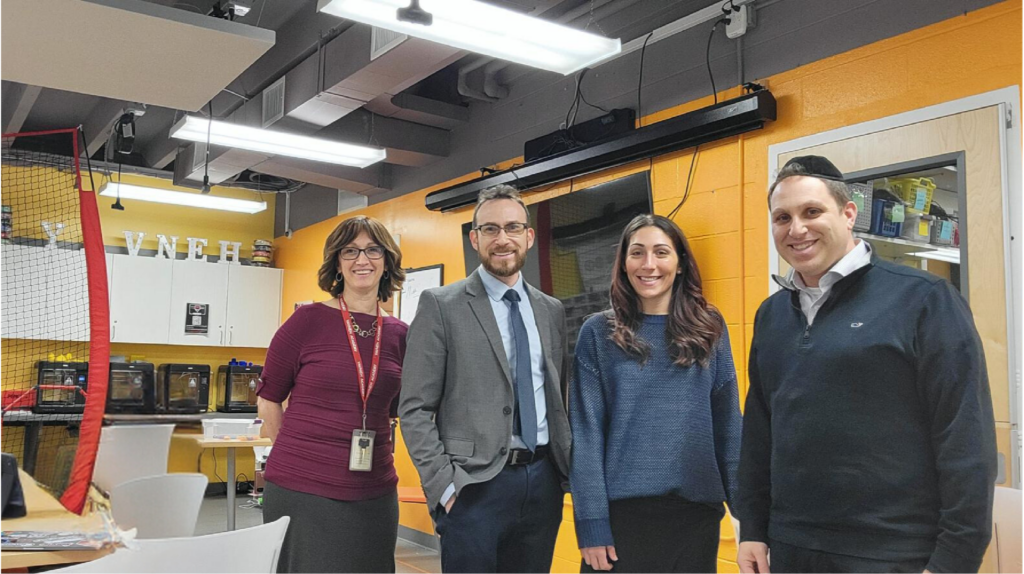
Over the last four years, New Jersey’s nonpublic school STEM initiative has experienced tremendous growth, benefiting yeshivas and Jewish day schools across the state. Championed by community advocates, legislative partners and Teach NJ, and funded by the New Jersey Department of Education (DOE), the program provides nonpublic schools with public school educators qualified to teach STEM subjects, all at no additional cost to the schools or their families.
The program’s success is evident in the stories emerging from participating schools. For instance, at Rabbi Pesach Raymon Yeshiva (RPRY) in Edison, Mark Snow, a state-funded STEM teacher, taught students engineering and robotics this past year. He also led a group of their students to win first place in a STEM robotics competition. “This was a huge accomplishment for the students,” he said.
Yavneh Academy in Paramus, which just completed its first year of the STEM program, creatively sought ways to best utilize this program and secure as many teachers as possible. Next school year, Yavneh will have seven state-funded teachers. These teachers, who will provide about $50,000 in STEM instruction, are trained in various subjects including robotics, coding, engineering, circuitry, algebra, geometry, computer science, biology, earth science and more.
“We have seen a lot of growth as the students developed new STEM skills, especially in the engineering process,” said Jason David, director of technology and curriculum design innovator at Yavneh Academy. For instance, the engineering class’ capstone project challenged students to program hexbugs to navigate mazes using all the skills and knowledge they had learned that trimester, while the robotics class wrapped up with a competition among students.
While some schools are leveraging these teachers to expand their curricula to include courses such as STEM labs and computer science, other schools can now offer advanced tracks. Heichal HaTorah in Teaneck will be offering two Advanced Placement (AP) courses taught by these teachers for the 2024-25 school year, enabling their students to earn college credits while in high school. Many of these classes are being offered at yeshivas and Jewish day schools in New Jersey for the first time.
The uniqueness of the program is its integration with public school teachers. The teachers sign up for the program, are paid directly through their districts and deliver high-quality STEM education at no additional cost to the schools or their families. Last year, 90 public school teachers participated in the program and will expand in the coming year to include 110 teachers.
Feedback from both teachers and students has been overwhelmingly positive. Yavneh’s David said that he expected the teachers to come in, teach their elective and leave. “But what we all noticed, the teachers too, was that it went well beyond teaching,” he shared. “They created amazing relationships with our students. When one STEM teacher went on maternity leave, the students sent her a card from the class.”
Yeshivas Beis Hillel (YBH) in Passaic has seen its students carry their success in STEM to all areas of learning. “Some of them struggle with self-esteem and this program really showed how well they can do,” said Rabbi Yaakov Rabinowitz, general studies principal for YBH middle school. “Some students who are not necessarily academically strong in a regular classroom setting did very well in the STEM electives. They took to it and developed newfound confidence, giving them a chance to shine in a non-typical learning environment.”
Last year, a YBH student was failing multiple subjects when he joined one of the program’s STEM electives. By the third trimester he had completely turned things around, going from a D on his first report card to a B at the end of the year. Rabinowitz is certain this was partly due to STEM helping build this student’s confidence. “It’s a healthy outlet that cultivates a wonderful sense of learning outside the regular classroom,” he added.
Teach NJ has advocated for and helped secure funding from New Jersey’s Department of Education for this initiative since 2019. So far, about $4.5 million total has been awarded to New Jersey nonpublic schools for the first five years of the program, including an astounding $2.2 million for the next school year alone. Of that $2.2 million, about $2 million — roughly 90% of the funding — was awarded to yeshivas and Jewish day schools. Throughout all five years of the program, Teach NJ has directly guided nearly all the participating nonpublic schools through every step of the program.
Adam Katz, Teach NJ’s associate director of government programs and manager of the program, said, “The growth of this initiative has been staggering. Each year we dedicate ourselves to finding more teachers, helping more schools and simplifying the application process.” It’s been unbelievably effective, and the proof is that in the first year of the program, there were six state-funded teachers at four schools and in year five, 110 teachers will be teaching
at 41 schools. That’s more than 18 times growth over five years. As the program enrs its fifth year in September, its impact continues. The goal is not only to enhance the quality of STEM education but also provide significant financial benefits to hardworking public school teachers.
As Snow put it, “I believe that the New Jersey DOE STEM Grant Program is the perfect way to expand on the STEM programs at nonpublic schools. Experienced public school teachers can provide a different perspective on STEM education to the nonpublic schools, while the nonpublic schools provide the teachers with new perspectives and challenges to help them grow as professional educators.”
By providing schools with resources they need and connecting them with dedicated public school teachers, this program ensures that our students receive high-quality STEM education, preparing them for future success, at no cost to the schools or families.










